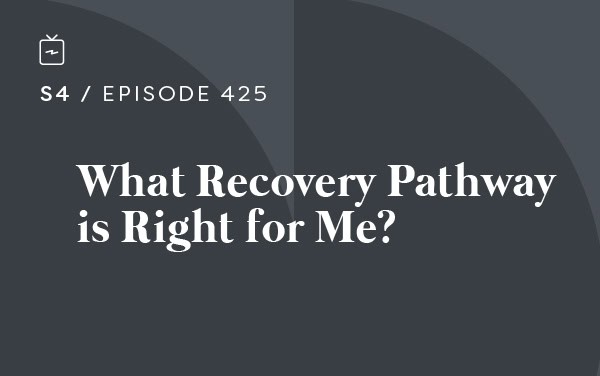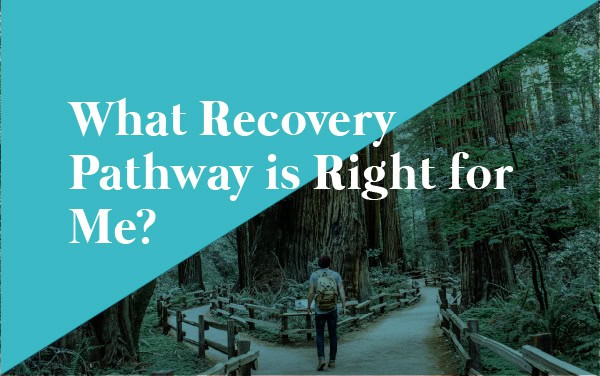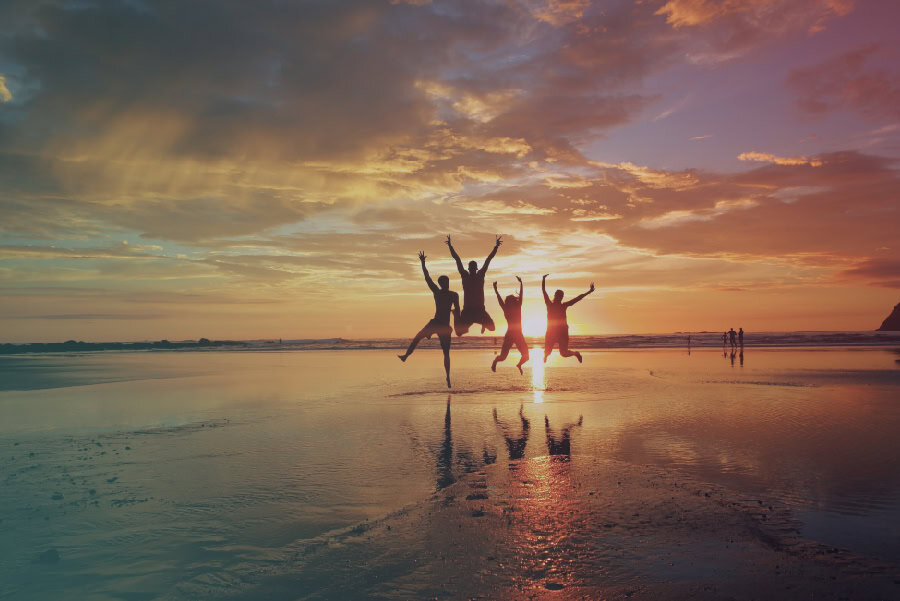
by Kris Oyen | Apr 10, 2023 | Podcast
Podcast: Play in new window | Download
Subscribe to the Recovery Elevator Podcast Apple Podcasts | | More
Episode 425 – What Recovery Pathway is Right for Me?
Today we have Doug. He is 59, from Buena Vista, CO and he took his last drink on July 28, 1982.
Join Recovery Elevator in Atlanta over Memorial Day weekend for a fun conference style meet up at the Marriott in Alpharetta. This event is all about getting your connect on and it will be a fun time. Spouses or loved ones are encouraged to attend the Sunday night event and Silent Disco afterwards!
[2:30] Thoughts from Paul:
When building your recovery portfolio, a good goal is 50% external and 50% internal. At first, the internal work may be too big of an ask, but as your nervous system settles down, you want to aim for a balanced split. Here are some quick examples of what I mean when I say external vs internal:
External:
Driving to an AA meeting, or hopping on a Café RE zoom chat
Phoning a sober friend
Working with a sponsor
Internal:
Meditation
Journaling
Reading Quit-Lit
When building out your recovery I recommend this 5-tiered approach:
- Community – AA, SMART, Café RE, therapy, sober friends. Burn the Ships!
- Action/Movement – Chemicals of wellbeing, endorphins, dopamine, and serotonin are released when we move.
- Inner Peace – Meditation, breathwork, creative ventures, writing, time in nature.
- Knowledge – Podcasts, Quit-Lit, learning about new things in and out of recovery.
- Universe – This is not religion, but it is the spiritual component of recovery.
Better Help: www.betterhelp.com/elevator – 10% off your first month. #sponsored
[11:55] Paul introduces Doug:
Doug had his last drink on July 28th, 1982, when he was 19 years old. He lives in Buena Vista, CO and is married and they have two adult children. He has worked in upholstery, cabinet building and installations, and has built some houses with his son. He enjoys the mountains, biking and riding his motorcycle.
Doug grew up in a normal family and wasn’t exposed to heavy drinking. His first experience with alcohol was when he was 4 years old when he remembers having a few sips of his mother’s drink. He felt the warm glow and really liked it. Later when he was 12, a friend of his stole a bottle of liquor from his parents and while his friends were mixing it with soft drinks, Doug drank straight from the bottle. He felt something click – suddenly, he felt normal, and like everyone else.
When Doug was 16 his mother passed away and the drinking escalated and continued to be excessive after graduation. Some friends invited him to Alateen meetings, and he started attending weekly. Once a month AA members would come in and share their stories. He started identifying with some of the stories which got him to start question his drinking. He realized that he was becoming less like the person that he wanted to be.
When one of his former drinking friends disappeared from the meetings, he found out that they were working on sobriety with AA. That friend was a speaker at one of the meetings, and Doug noticed that they looked healthy and at peace. He chose to speak to him afterwards and expressed an interest in possibly attending AA but wasn’t quite ready for it.
Doug finally accepted the invitations to attend and was planning to go to a meeting on July 29th. The night before he found himself drinking and when he saw himself in a mirror started asking himself why he was drinking. He didn’t have a good answer for that.
AA has been a big tool for Doug, along with volunteer work. He knows that if he had continued drinking, he would not have had the life he has. He believes in counting blessings, finding things to be grateful for and putting sobriety before everything else.
Cafe RE Use the promo code OPPORTUNITY to waive the set-up fee.
Recovery Elevator YouTube
Sobriety Tracker iTunes
Recovery Elevator
Go big, because eventually we all go home
I love you guys

by Kerri MacFarlane | Jul 11, 2023 | Alcohol Free, Blog, Early Sobriety, Helpful Tips
In our Dry January course, REstore, Paul teaches a class covering the different recovery modalities. The good news is that In 2023, there are more ways to ditch the booze than ever before. Even just 10 years ago recovery took place in church basements with bad coffee and shitty donuts, but today the landscape is much different.
**Side note, Paul still goes to an AA meeting, in a church basement with bad coffee. He’s not dawging that way of recovery, he loves his Tuesday night AA meeting, but there are so many more methods, programs, techniques…you name it…available today.
So which pathway is right for you?
A couple caveats before we begin.
Caveat 1. If you are READY then ANY pathway is going to work for you. If you’re truly sick and tired of being sick and tired, then any of these programs will work. In addition, you HAVE to give them a solid try.
Caveat 2 – There is no right or wrong way to quit drinking. We’re going to give some recommendations, but it’s up to you to figure out what works best for you.
When building your recovery portfolio you want this work to be 50% external – 50% internal. At first, the internal work may be too big of an ask, but as your nervous system settles down, you want to aim for a balanced split.
Here are some quick examples of what external vs internal is:
External
- Driving to an AA meeting, or hopping on a Café RE zoom chat
- Phoning a sober friend
- Working with a sponsor
Internal
- Meditation
- Journaling
- Reading quit lit
When building out your recovery pathway Paul recommends this 5 tiered approach. .
5 Tiered Approach
- Community
- Action/Movement
- Inner Peace
- Knowledge
- Universe
- Community – Let’s talk programs that are community focused.
A.A., Smart Recovery, Dharma Recovery, Life Ring, Women for Recovery, Café RE, The Lucky Club, Meetup.com, online sober communities, Reddit, talkingsober.com, our sober Ukulele Course, Dry January and Photo courses, phoning a sober friend, 1:1 Interaction within another person in recovery. Meeting with a counselor or therapist falls under this community approach.
All of these tiers are important but this one is a BIG ONE. In order for you to get the most out of this, you have to first burn the ships, with yourself, then with your community. Burning the ships = Accountability which then = Community.
- Action/Movement
Yoga, dance, music, ecstatic dance, hiking, stretching, running, swimming, drumming on your desk. Your body is meant to move. Chemicals of wellbeing, endorphins, dopamine, and serotonin are released when we move. 3x a week, for 20 min is a good starting point.
- Inner Peace/Creation
Meditation, breathwork, sunrises, sunsets, time spent in nature, time spent with animals, float tank, relaxing, chanting, journaling, inner child work, singing, playing music, painting, writing poetry. This is where you create your new life that no longer requires alcohol. One reason why pen to paper is so effective is you can’t write as fast as the mind can think, so it slows down the thinking mind.
About animals – their nervous systems are much more intact, or less frenzied than ours. Animals live life from the hearts opposed to their human counterparts who live mostly in thought. A recent study shows that similar amount of oxytocin is released when we hug a dog compared to when we hug a human. And flip side to that, oxytocin, or the love molecule is released in dogs, when we pet them. If you’re feeling fraught, visit a petting zoo or kick it with a pet. Human nervous systems can attune themselves to more stable nervous systems, even those of animals.
- Knowledge
This is learning. This is empowering yourself with information. Podcasts, quit lit books, audiobooks, learn about healthy diets, learn about how the mind works. No you cannot read or listen yourself out of an addiction, but this is an important tier. Under this umbrella includes medicines both from the east and west. Perhaps Naltrexone, or the Sinclair method is something you may want to try. Naltrexone is a medication that blocks the euphoria response when we drink alcohol. Perhaps more shamanic approaches with medicines such as ayahuasca, psilocybin, San Pedro or Ibogaine may be right for you.
- The Universe
Lets get clear, this is not religion, but it is the spirituality component of recovery. One of the beautiful purposes of an addiction is it can flex the layers of the ego so much that they eventually snap…letting in what some will call their higher power.
When you say lines to yourself like, “I can’t live like this anymore.” The Universe is right there with you saying, “no problem, let me show you the way.”
Now go slow with the universe. This was the last of the five tiers to implement itself in Paul’s sobriety journey. This one most likely is on the universe’s clock and not yours. But be open, pay attention to the breadcrumbs of life and don’t be afraid to ask for assistance or guidance from the universe at any time.
There’s a well remixed line that has been floating around for several thousand years. Ask and you shall receive.
To recap, 50% internal, 50% external and hit a couple things from the five tiers ,and you’ll be just fine.
Remember, your recovery is always changing, because you are. It should change. What you’re doing now should look different than what you were doing a month or year ago.
***Taken from Recovery Elevator Podcast, Episode 425, host Paul Churchill***

by Paul Churchill | Oct 14, 2020
What is RE-Connect? The opposite of addiction is connection. At RE-Connect, you’ll do just that. You’ll connect again with other humans, nature, animals, water, earth, stars, planets, plants, food, and most importantly, your authentic self. The Guanacaste...

by Paul Churchill | Jan 21, 2019 | Podcast
Podcast: Play in new window | Download
Subscribe to the Recovery Elevator Podcast Apple Podcasts | | More
Kane, with 49 days of sobriety, shares his story.
On January 1st, I launched the 3rd private, unsearchable Facebook accountability group. All Café RE signups starting January 1st-January 31st will be placed in the new group. This group will be capped at 300 members to ensure intimacy. For the entire month of January, you can use the promo code 2019 for 75% off registration.
If you’re a Recovery Elevator podcast listener and you live in or close to the Nashville area, join us Saturday, February 23rd for Recovery Elevator LIVE in Nashville at 7 pm. Go to recoveryelevator.com for more info.
Recover Who We Were Meant To Be
Tony Robbins and Russell Brand recently did a podcast titled Recover Your True Self. In this episode there are two value bombs I want to talk about. The first is Russell Brand’s definition of recovery, and the other is his idea of the main intention of the 12 steps.
At the end of the episode, I share a story about letting go.
SHOW NOTES
[6:49 ] Paul introduces Kane
Kane is 45, lives in Adelaide, Australia, and has 49 days of sobriety. He is a government worker. He loves hiking and doing yoga in the mornings. He is also a birdwatcher. He likes socializing, and has been doing more social events since he’s been sober.
[ 11:00 ] Give us a little background about your drinking.
He started drinking in late high school, and quickly progressed to “drinking for drunkenness.” In college, alcohol became an escape from “this busy brain.” He surrounded himself with friends who drank like he did.
[31:40 ] What does a typical day in your recovery look like?
He gets up early, does yoga and goes to work. After work, he takes his dog Rusty for a walk, and spends time with his wife (without fighting). He has been surprised by how much he enjoys socializing in sobriety
[40:39] What’s on your bucket list in sobriety?
First and foremost, to continue to improve his relationship with his family. He wants to keep expanding his honesty. He is looking forward to eventually getting a caravan (camper) and going on road trips with his wife, birdwatching along the way. He also looks forward to continuing having good times without alcohol.
[44:00] Rapid Fire Round
- What was your worst memory from drinking?
Not being as good a father as I thought I was.
- Did you ever have an “oh-shit” moment?
Waking up after a blackout, and finding a misspelled note on his phone that he’d written to himself telling him where he’d parked his car after trying not to drive while drunk.
- What’s your plan moving forward?
Socializing, yoga, taking responsibility.
- What’s your favorite resource in recovery?
The Recovery Elevator Podcast. He also has gone to an AA meeting, and enjoyed it. Learning to be able to be honest with others about not drinking.
- What’s the best advice you’ve ever received (on sobriety)?
Asking “Is this working for me?” and if the answer is “no” change it.
- What parting piece of guidance can you give listeners who are in recovery or thinking about quitting drinking?
Take responsibility for how you act.
- You might be an alcoholic if…
you ask your mother for lift to your car, because you’d been drinking the night before. When you get to where you think you left your car, it’s not there. You then remember that you’d driven it home drunk. You then ask your mother to drive you a little past your home where you had parked your car so your partner didn’t know you’d driven home drunk.
Resources mentioned in this episode:
Tony Robbins and Russell Brand Podcast, Recover Your True Self:
This episode is brought to you in support by Care/Of. For 25% off your first month of personalized Care/of vitamins, go to TakeCareOf.com and enter the promo code ELEVATOR
“We took the elevator down, we gotta take the stairs back up, we can do this!”






